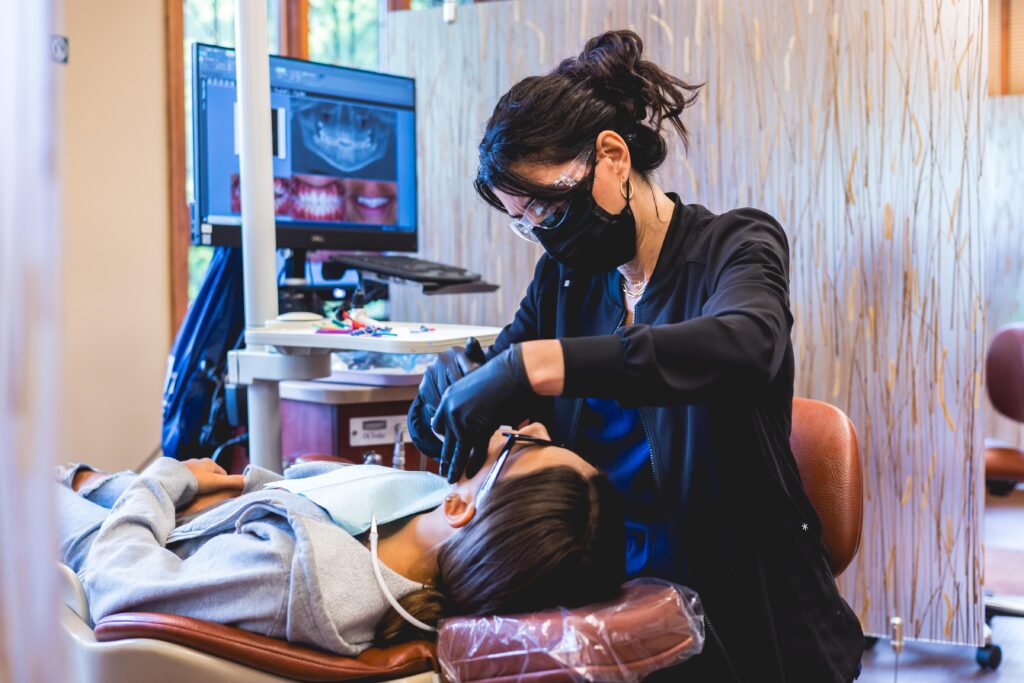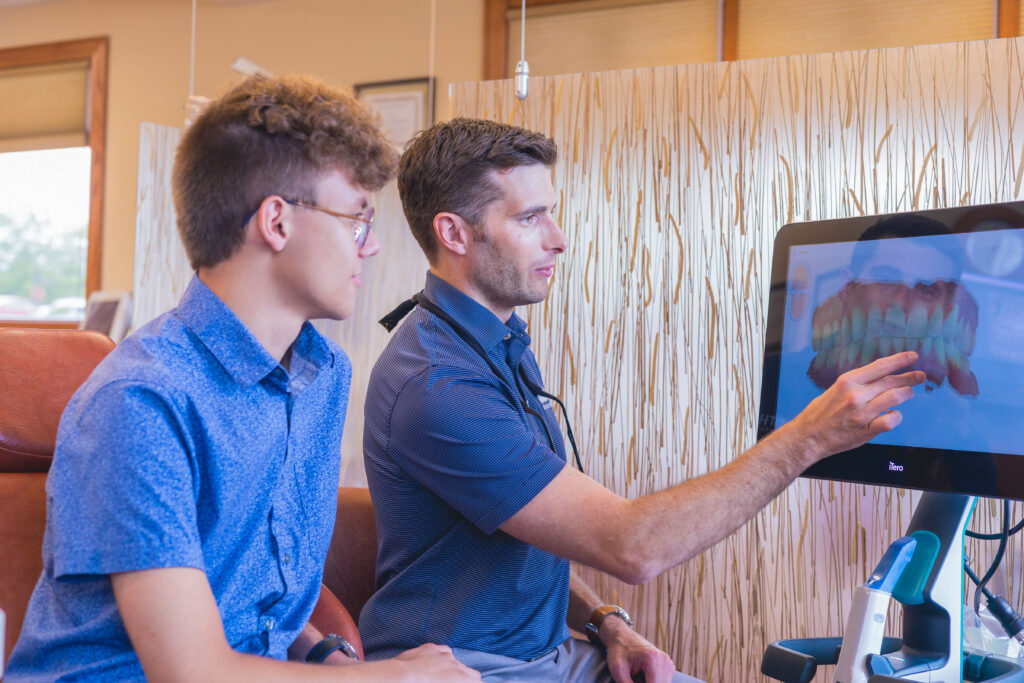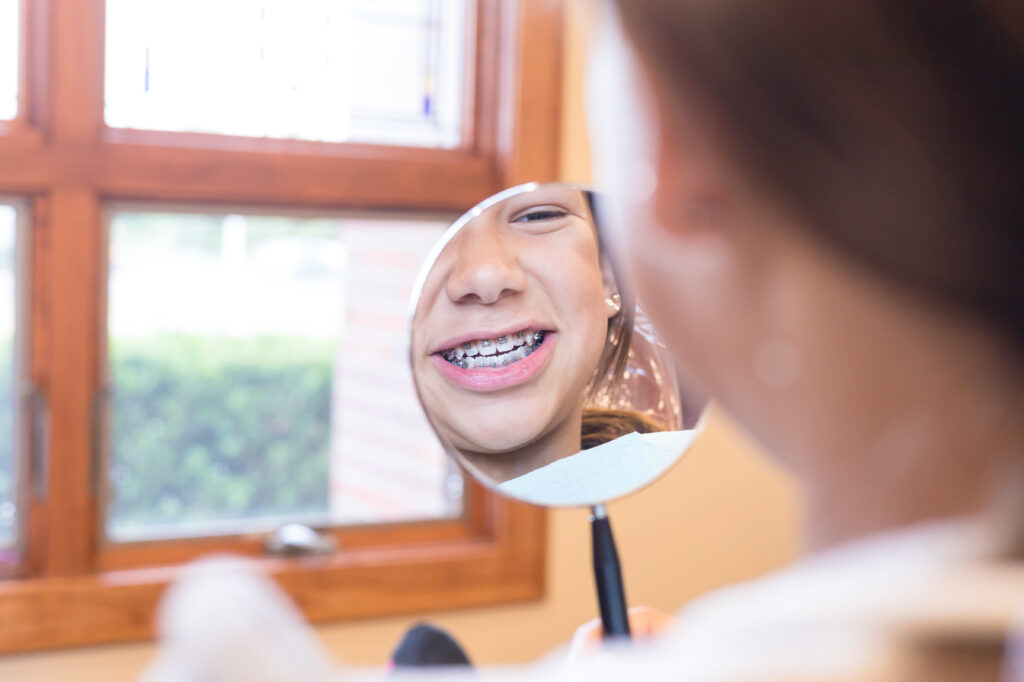Do you wake up in the morning with your teeth clenched or with a sore jaw? You might suffer from teeth grinding in your sleep, a condition known as sleep bruxism. At Booth Orthodontics, we see a lot of patients who experience sleep bruxism, but what causes it, and how can you prevent and treat it? Let’s find out!
Why Do I Grind My Teeth?
Though there are many reasons why you might grind your teeth, today we will focus on the most common reasons we see in our patients in Homer Glen.
Stress Or Anxiety
The leading cause of day and sleep bruxism is emotional stress and anxiety. These negative emotions can come from work, personal relationships, mental health, or other life events. You might grind your teeth in your sleep to exert or soothe the mental energy or load.
Alcohol, Smoking, Caffeine, And Poor Sleep
Lifestyle choices play a huge role in the severity of your bruxism. Consuming alcohol, nicotine, and caffeine can raise your anxiety levels, tense your muscles, and prevent the development of a healthy sleep pattern (which can increase your anxiety levels and create muscle tension, which disrupts your sleep and continues the cycle). Poor sleep, high anxiety, and tense muscles can lead to nighttime bruxism.
Medications
Certain medications, like SSRIs (antidepressants), antipsychotics, and stimulants, can cause involuntary teeth clenching or grinding.
Malocclusion
How your teeth and jaw are aligned can play a role in the development and severity of your bruxism. Misaligned teeth or an abnormal bite can create an uneven pressure distribution during jaw movements, sometimes resulting in grinding as teeth rub against each other and the jaw seeks a comfortable resting position.
Sleep Disorders And Physical Conditions
Those with sleep-related disorders are often more prone to grinding their teeth. Conditions like sleep apnea, where breathing stops during sleep temporarily, can be linked to increased bruxism episodes. Other conditions include neurological disorders like Parkinson’s or epilepsy, gastroesophageal reflux disorder (GERD), night terrors, ADHD, genetics, parasites, and more.
When discussing potential bruxism causes with Dr. Booth, your dentist, or your primary care physician, please be honest about your medications, lifestyle choices, and stress levels. Remember, your medical team is here to help you, not judge you, and we can’t give you the best possible advice if we don’t have all the information!
Note: Bruxism and its causes are still under investigation, and the above potential reasons are still up for debate.

How Do I Know If I Grind My Teeth In My Sleep?
Did you know that many people don’t even realize they have sleep bruxism until a partner tells them or they notice the consequences? It’s true! To help you maintain a healthy, attractive, pain-free smile, we’re going to share some bruxism warning signs to look for.
Dental Damage
Chronic grinding can result in significant wear and tear on the teeth. If not treated, this can lead to severe damage, such as cracks or fractures in the teeth that are costly or painful to fix. Teeth grinding in sleep can also wear away or weaken the enamel, the protective outer layer of a tooth. Compromised enamel leaves the teeth more susceptible to decay and sensitivity, which can also be unpleasant to repair.
Temporomandibular Joint Disorders (TMD)
Your temporomandibular joint suffers from the constant strain of grinding. This pressure can lead to TMD, an incurable jaw joint condition characterized by impaired jaw function. Symptoms include pain, difficulty chewing, challenges communicating, and locking of the jaw.
Fatigue
Pain or noises created by grinding can lead to brief moments of wakefulness that disrupt the sleep cycle. These interruptions can be so quick that you might not even recall them in the morning. Still, you’ll likely experience sleep deprivation, associated mood changes, fatigue, and decreased cognitive function the next day.
Increased Risk of Tooth Loss
The pressure from grinding can lead to receding gums, exposing more of the tooth’s root. In severe cases, it can even lead to loss of supporting bone. The combination of dental damage, gum recession, and potential bone loss means untreated sleep bruxism can increase the risk of losing one or more teeth.
Can Sleep Teeth Grinding Be Prevented Or Treated?
Unfortunately, if not treated, the symptoms of bruxism can worsen and have permanent effects on your smile and overall well-being. Fortunately, Booth Orthodontics in Homer Glen can help with the following treatments!
- Custom Mouthguards: One of the most popular treatments for sleep bruxism is custom-made night guards or splints. These appliances fit over the teeth, protecting the teeth from direct damage and helping redistribute the force from grinding by creating a barrier between the upper and lower sets of teeth.
- Teeth Alignment: Orthodontic treatments, such as traditional metal braces, aesthetic clear braces, or Invisalign clear aligners, can help correct bite issues. Aligned teeth and a jaw that can rest comfortably and properly function will have a decreased risk of nocturnal grinding.
- Palatal Expanders: For those with narrow upper jaws, palatal expanders can be beneficial. By widening the upper jaw, you can experience less difficulty breathing and eating, reducing night bruxism.
- Surgical Orthodontics: In complex cases, jaw surgery might be considered. This approach addresses underlying skeletal issues, providing a more permanent solution.
- Regular Check-ups: Regular visits to Booth Orthodontics can help monitor the progression of bruxism and the effectiveness of treatments, allowing Dr. Booth to adjust your braces or treatment plans as necessary.
Other treatment options include stress management, anxiety therapy, changing your medications, and making lifestyle adjustments such as improving your sleep schedule and taking less harmful stimulants.

Visit Booth Orthodontics For Expert Help!
Schedule your free consultation with us in Homer Glen to begin your customized orthodontic treatment program! We proudly help patients of all ages treat alignment issues ranging from severe to complex. Our team at Booth Orthodontics can’t wait to see your transformation!
 Dr. Ryan Booth
Dr. Ryan Booth
